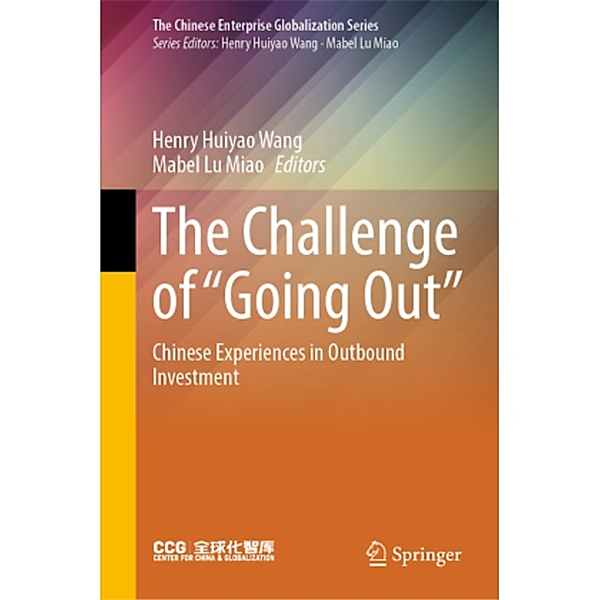CCG New Book | The Challenge of “Going Out”
November 29 , 2023The Challenge of “Going Out”: Chinese Experiences in Outbound Investment
Edited by Henry Huiyao Wang, Ph.D. and Mabel Lu Miao, Ph.D.
Published by Springer Nature in November 2023
The Challenge of “Going Out” : Chinese Experiences in Outbound Investment is part of the prestigious Chinese Enterprise Globalization Series, published in conjunction with the renowned international publisher Springer Nature, is now available worldwide. Edited by Dr. Henry Huiyao Wang and Dr. Mabel Lu Miao, this book provides a comprehensive look at the growing trend in outward investment by Chinese enterprises. It encapsulates the phrase “zou chu qu” or “going out,” highlighting the shift in Chinese companies’ strategies from a focus on domestic growth to seeking opportunities in global markets. The introduction of the book discusses the significant growth of China since its accession to the WTO in 2001 and its integration into the global economy over the last two decades. It also the complexities and challenges faced by Chinese companies as they navigate the global business environment, dealing with challenges ranging from protectionist policies and geopolitical issues to the overall global economic slowdown in recent years.
The book is divided into five main parts, each focusing on different aspects of outbound investment and the “going out” process.
The first section, titled Policy and Environment, addresses the policies that shape and influence the outbound investment strategies of Chinese companies. This part includes discussions on the Chinese government’s guidelines and incentives for enterprises “going out,” as well as the regulatory landscape that these companies encounter in foreign markets. It also covers how international trade agreements and geopolitical shifts impact Chinese outward investments.
The second part, Underlying Trends and Influencing Factors, explores the driving forces behind the surge in Chinese outbound investments. It examines economic, technological, and market trends that have emboldened Chinese enterprises to seek opportunities abroad. The section also explores the strategic considerations of Chinese companies, such as accessing new markets, acquiring technology and brand assets, and diversifying holdings.
The third part, Legal and Compliance Concerns, is also a crucial part consideration for Chinese enterprises and looks at the legal challenges and compliance issues that Chinese companies face when investing overseas. It examines how to navigate different legal systems, understand international trade laws, and ensure compliance with regulations in areas like environmental protection, labor rights, and corporate governance.
The fourth part, Opportunities and Risks in Developed Economies, focuses on developed markets and analyzes the opportunities and challenges in these environments. It looks at how Chinese companies adapt to more competitive and regulated markets, manage cultural and business practice differences, and deal with issues such as market saturation and higher operational costs.
The final part, Notable “Going Out” Case Studies, puts theory into practice by presenting case studies of successful Chinese enterprises. This section analyzes successful companies like Geely, which acquired Volvo, and Fuyao Group, known for its investment and integration into the US market. These case studies not only highlight successes but also examine the challenges these companies faced and how they overcame them.
Each section of the book is structured to provide a comprehensive understanding of the complexities and nuances of Chinese outbound investment, making it an essential resource for business leaders, policymakers, and academics interested in international business and economic relations.
The volume editors have worked to provide valuable insights and perspectives for Chinese companies, government, and potential international partners, while at the same time enhancing understanding and knowledge of new environments in terms of legal compliance, corporate culture, or local engagement. This book is a valuable resource for understanding the dynamics of how Chinese enterprises are expanding globally and the challenges and opportunities they face in the process.
About the Editors
Henry Huiyao Wang, Ph.D. is Founder and President of Center for China and Globalization (CCG), ranked among the top 100 think tanks in the world. He is also Dean of the Institute of Development Studies of Southwestern University of Finance and Economics of China, Vice Chairman of the China Association for International Cooperation, and a Director at the Chinese People’s Institute of Foreign Affairs. He is currently a steering committee member of the Paris Peace Forum and an advisory board member at Duke Kunshan University. He has also served as an expert advisor at the World Bank, IOM, and ILO. He pursued his Ph.D. studies at the University of Western Ontario and University of Manch- ester and he was a senior fellow at Harvard Kennedy School and a visiting fellow at Brookings Institute.
Mabel Lu Miao, Ph.D. is the Secretary-General of CCG, a Munich Security Conference (MSC) Young Leader, and the Deputy Director General of the Inter- national Writing Center of Beijing Normal University. She is also an Adjunct Professor at Huaqiao University and an Adjunct Researcher at Beijing Foreign Studies University. She received her Ph.D. in Contemporary Chinese Studies from Beijing Normal University and has been a visiting scholar at New York University’s China House and the Fairbank Center at Harvard University.









